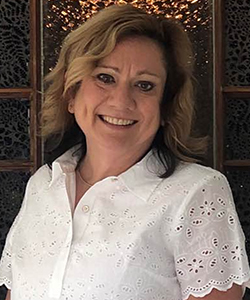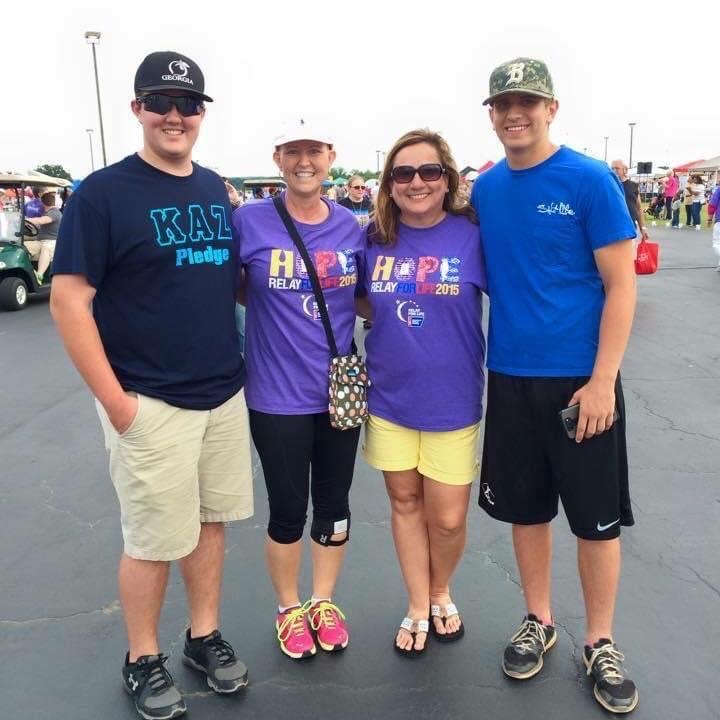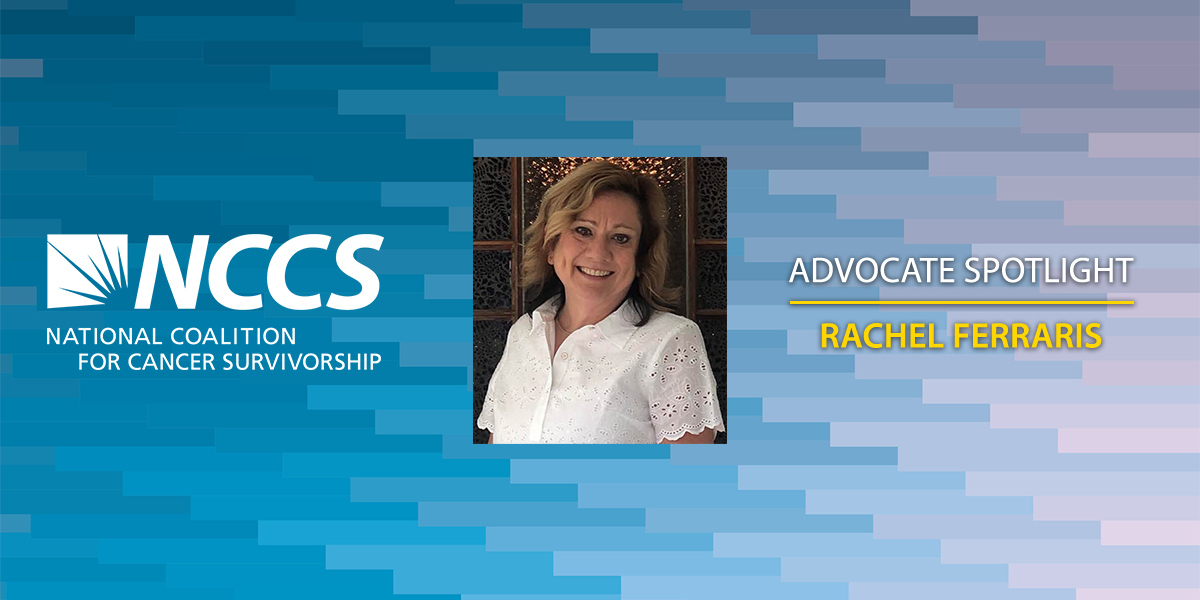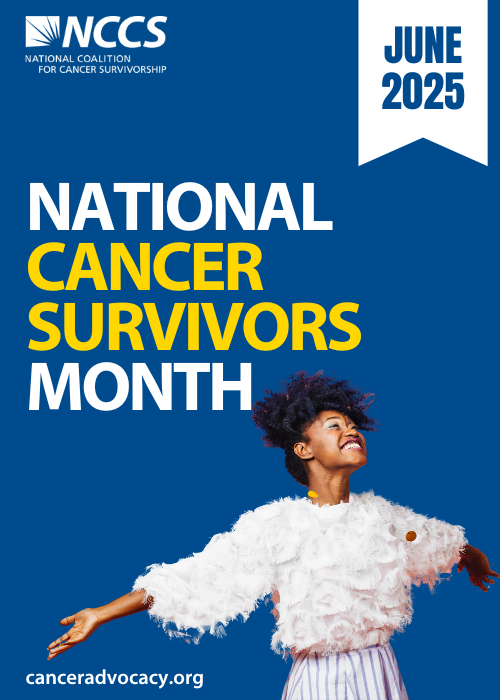NCCS Advocate Spotlight: Rachel Ferraris

Advocate Spotlight July 2021 | Rachel Ferraris
Nearly all cancer survivors can reflect on their cancer journey and recall one specific moment – the low point. To be able to reflect on that moment is, of course, the real gift. It means you are a survivor. Reaching the light of survivorship though is only done by traveling through the dark places where light is difficult to see.
For Rachel Ferraris, who recently celebrated her 15th Cancerversary® from a Stage 3B breast cancer diagnosis, her low point is easy to remember.
“The weekend after my diagnosis changed from ‘we caught it early stage 1’ to ‘this is actually stage 3’ I had a meltdown,” she recalls. “That Saturday night I threw the phone across the room against the wall and ran and had a meltdown. I was in my dark space.”
“My husband told me, ‘We don’t have a battle, we have a war,’” she recalls. “And the next morning he got me up and said let’s go, we’re going to church.”
“The message of that day’s sermon, which was written six weeks prior, was that we all face darkness at times, but God sends someone to light our path out of that darkness. I was in that dark place,” says Ferraris.
“That night at Sunday services we sang two beautiful songs, “I Surrender All” and “My Life is in Your Hands” and I went to the altar and prayed. God, you’ve placed this in my journey and I’m giving it back to you for your glory.”
“That was the turning point for me,” she says.
Since that point, Ferraris has spent the subsequent 15 years advocating not just for herself, but for cancer patients everywhere by lobbying on Capitol Hill, working as a patient navigator in the healthcare system and recently becoming a hospice educator for care providers, patients, and families.
As a stay-at-home mom in a military family, she was often the only parent available for her two children as she battled her cancer. So she is well-versed in the struggles of daily family life while battling for your own life. Often, she had to depend on her friends, neighbors, and eventually as they got old enough, her kids, to do things like drive her to the emergency room as she suffered a variety of complications for years after her treatment.
“I had a lot of non-textbook complications for about four years,” she says. “I got by on the unconditional love of my support network.”
These experiences also brought into focus for her the importance of having a survivorship care plan, and the importance of having legislation that supports survivors in being able to pay for a care plan through programs like Medicare.
“At one point we were lobbying for survivorship care to Senator David Perdue’s (R-GA) staff, and I realized that my kids couldn’t tell my history to a care provider if they needed to do so,” recalls Ferraris. “Thankfully, I was always able to communicate my own history, but that’s not always the case for patients and it made me realize the importance of survivorship care.”
Legislation to support survivorship care has been previously introduced in the House chamber of Congress by Representative Mark DeSaulnier (D-CA). He is expected to do so again in 2021. The Cancer Care Planning and Communications Act (CCPCA), previously introduced in the 116th Congress as H.R. 3385, would establish a Medicare service for cancer planning to help individuals like Ferraris ensure they have every opportunity to receive a high-quality and coordinated care plan from diagnosis throughout their cancer journey.
Ferraris says the other lesson learned in that experience is that she and her husband may have tried too hard to protect their children from the ugly parts of her cancer experience and inadvertently denied them the support they needed as they experienced their mom’s journey.
“The last CPAT Symposium I attended in person, my son Jon David shared his story as child growing up with cancer,” she recalls. “He was 19 when he spoke. He was in kindergarten when I was diagnosed. He really opened my eyes to some things I never really thought about before.”
“We tried our best to protect them from the ugly side of the journey,” says Ferraris. “It was hard to hear about his fears that were there, and we never addressed them. We never saw them. I wish along the way we would have paused to see if they had any questions about where we were, because they had fear.”
Still, the opportunity to hear her now adult son speak on his experience as a co-survivor is one for which she is grateful. Like many survivors, Ferraris has seen friends who were not afforded those same opportunities.
“I think of my friend, Robin, often. Our kids are the same age and were in school together,” Ferraris recalls. “She was a survivor of three years after her first battle with cancer. Unfortunately, she had a recurrence while our kids were still in school, and she passed. I often think, why did I get to see my kids graduate high school and she didn’t?”
“I remember in 2015, Robin and I did the Relay for Life and walked the survivor lap together. When they asked our co-survivors to join, our kids joined us. A friend snapped a picture of the four of us and that’s still one of my favorite pictures.”

Pictured at the 2015 Relay for Life, from left: Robin’s son RJ, Robin, Rachel, Rachel’s son Jon David.
It’s in those moments of asking why she’s still here 15 years later and others are not, that Ferraris relies on her faith. “There’s a reason I’m still here,” she says. “It’s because He isn’t done with me yet. My story hasn’t ended.”
Today, Ferraris’ story, guided by her faith, has her using all the lessons learned throughout her journeys of survivorship, and advocacy within the systems of healthcare and government, in her work for a local non-profit hospice. Her days are filled traveling around clinics and doctor offices educating staff on hospice benefits and services so they can help patients transfer their care from curative to comfort.
A month into her new role, Ferraris says, “I love it. It’s a challenge, but I’m not used to backing down to a challenge.”



